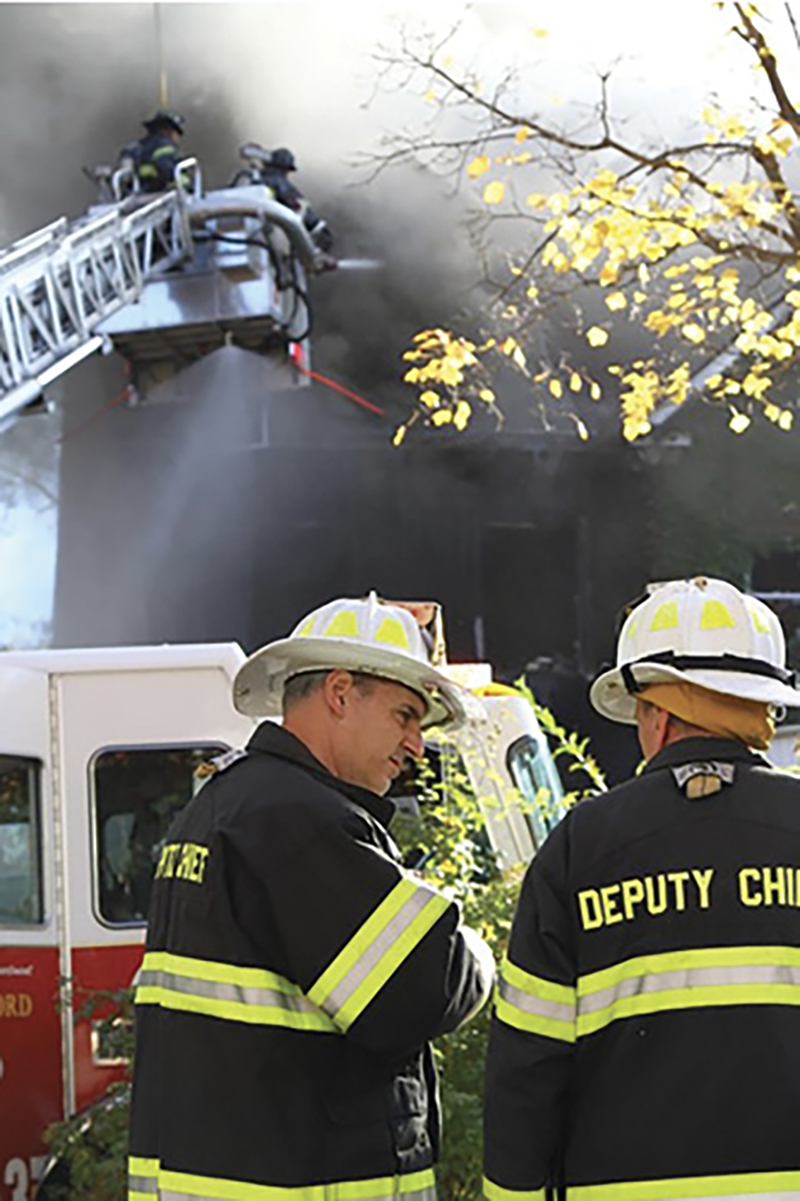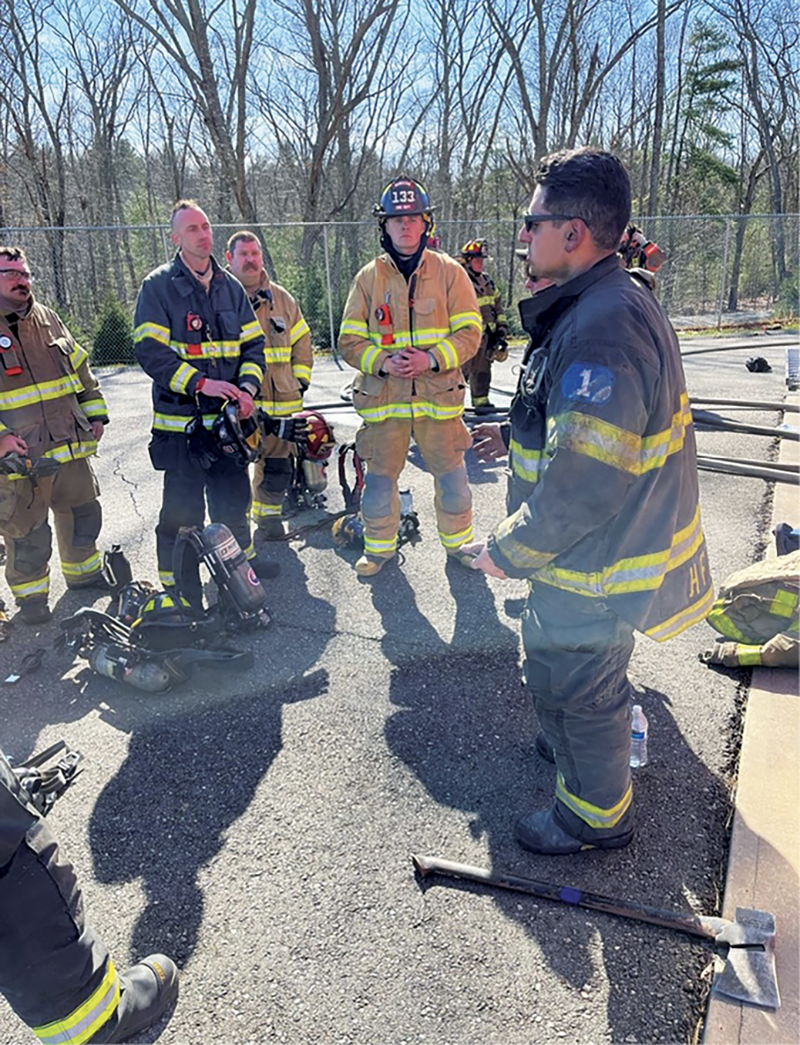By Leigh H. Shapiro
What creates the synergy among an effective and efficient crew of firefighters on any given apparatus, in a firehouse, or on a particular shift? You know it when you don’t see it, right?
- The Dynamics of Change Leadership in the Fire Service
- Fire Officers: Are You a Manager or a Leader?
- Fire(fighter)-Related Human Behavior: Understanding Cognitive Limitations on the Fireground
We’ve all grumbled beneath our frustrated breath at some point over a “not very effective” crew. What exactly is it—the right combination of people, the right time, or the right motivation? Could it be sheer luck, or is it by design or engineering? Why are some crews great at what they do, and others simply show up for work or are merely thought of as “the help”? Are we each viewed as individuals or are we cohorts with an enduring bond or creed, or maybe professional colleagues striving for the best that we can deliver? What causes firefighters working closely together to go above and beyond what is expected, while others put just as much effort into being disengaged and uninformed as possible, with expected minimal results? What is the mortar between these bricks made of, so to speak?
Mentoring Works
The answer is in how mentoring influences and guides firefighters and officers alike. This positive input, usually combined with institutional knowledge, experience, and enthusiastic magnetism, ultimately empowers ambition, energizes morale, and provides the direction and guidance needed to fill the gaps in training and experience. This almost always produces an enhanced quality result: a better firefighter.
Need proof? How many times have we seen dysfunctional crews, firehouses, or shifts turned around by effective leadership? Providing strong guidance with clear expectations, setting the tone, administering inclusive authority while simultaneously maintaining responsibility for the outcome, “actually knowing” your job instead of repeatedly professing that you know your job, unwavering and steadfast humility, and just plain respecting everyone for who they are is what I found most effective during my tenure and beyond. And yes, sometimes the “squeaky wheel” crew member doesn’t always get the oil; he gets replaced!
But to merely attribute this solely to leadership then raises the question, what drives that leadership? What is it that makes an effective leader? If I buy a hammer at a hardware store, am I now a carpenter or, worse, a professional? No; thankfully there’s more to it.
Mentoring is a peer-to-peer, two-way street and moves in any direction, even to somebody outside your department. It can flow upward to higher ranks and flow downward to the probies and the new members. It can be delivered individually or in group settings. However, merely citing and applying the term “leadership”’ is too broad and really doesn’t define the core transaction of learning. Coaching and guidance from a mentor are not simply receiving information and direction when needed, which can be situational and fleeting. Mentoring can often show you, beyond telling you, how to carry yourself and conduct your business, both professionally and personally, especially when interacting with fellow firefighters; the administration; and your core customer base, the public. Sometimes, mentoring can even be more effective at mitigating screw-ups and bad actors than progressive discipline can. Basically, it can serve as the needed direction in someone’s career and even in his life, whether in the immediate or long term, to inspire someone to emulate characteristics and define himself.
It can also sustain hope when you may need it most. Years ago, when I tested and ranked too low on the deputy chief’s list to be promoted, several mentors recognized my self-inflicted anguish and carefully proceeded to reaffirm my value, restate my purpose, and build me back up mentally to where I needed to be and to where they expected me to remain. They propelled me on the course of resolve and preparation for the next scheduled exam (three years later), for which I ultimately scored number one on the list and got promoted to deputy chief. Their guidance instilled in me the confidence, fortitude, and perseverance I needed to take full advantage of the next few years and build my level of training, education, and experience, which was vital to achieve my goal.

(1) At this two-alarm house fire, I as the assistant chief (left) mentor the junior chief officer (right), the incident commander, assisting with thoroughness, organization, and peripheral responsibilities (other incidents occurring elsewhere in the city). (Photo by Pat Dooley.)
There are many who profess knowledge, skills and abilities (KSAs), but to be effective for you personally, you need to find that which you are comfortable with and what works for you. Many people will “provide” you mentoring, but you need to decide if you want to engage that style and message. You need to figure out what works best for you and not merely follow someone blindly because they have a title or KSAs. Several individuals I considered mentors throughout my career have shown me how to do it, and how not to do it—both the good examples and the bad examples! I learned early on not to judge by appearances—everyone you interact with has some takeaway knowledge for you. You just need to recognize and identify it, then decide what to do with it.
The “Red Car”
Although many names come to mind, I distinctly remember what each mentor taught me, both the big concepts and the quiet little details. When I was a captain, I was assigned my first shift as acting deputy chief in the district SUV, known to Hartford Fire as the “Red Car.” I was working directly with a chief’s aide (affectionately called the Red Car drivers) and would respond to calls with a given assignment and act as the chief officer running the operation. Although I was prepared to rise to the challenge with my skill sets, it was the Red Car drivers who taught me and everyone who served in that position the job of deputy chief. On my first day, I walked into the district chief’s office, fully expecting to be shown around, to receive guidance and direction, and to ease into my new duties and responsibilities. Instead, the chief officer I was relieving simply said, “Sit here!” and pointed to the desk chair and then said, “When the bell hits, get in the car!” and walked out of the office. That’s it—that’s all I got from him!
I stood in the office for a brief minute when, suddenly, the firehouse alert system sprang to life reporting a neighborhood church on fire down the street, of all things with which to start my new responsibilities! After the dispatcher finished giving out the assignment, the office phone rang where I was standing. Dumbfounded and trying to keep my emotions in check, I answered it quickly. It was the chief officer I had just relieved, who had gone to the kitchen to get some coffee and was calling me from just across the apparatus bay floor. When he spoke, I could hear him both over the phone and from the kitchen, because he was laughing loudly when he said, “Funny thing about those church fires—you can never really put them out!” then slammed the phone down! Just then, the Red Car driver stepped into the office to make sure I knew we had a call, and that’s when I realized I would be all right.
For the next 10 years, I was fortunate to have sought out and gravitated to excellent leaders and mentors to learn my craft as a chief officer, so when I was eventually promoted into that position, I was prepared but, more importantly, ready to effectively fulfil my duties and responsibilities. That church fire call turned out to be a boiler malfunction—no biggie!
When I was a newly minted lieutenant assigned to a busy engine company, I had acquired the KSAs to perform my new duties, but it was the very seasoned apparatus operator with which I was assigned who really spent the time showing me the ways of the job. He was an indispensable, an invaluable, and a trusted mentor during my time with him. The knowledge I learned from him helped guide me for the remainder of my career.

(2) A skilled, experienced 15-year department veteran and driver of its heavy rescue unit mentors students on the most effective and efficient way to conduct a rapid search inside a fire building. Such mentoring is invaluable because it communicates relevant coaching beyond the students’ training and experience. (Photo by author.)
What Makes the Difference?
What is it about a particular individual you’ve interacted with, perhaps a long time ago or maybe recently, that has such staying power that it gets stuck in your head and even creeps into your bones? Most firefighters aren’t looking for a friend; they’re looking for guidance and validation. They are seeking confirmation that their input and effort are important, necessary, valuable, and appreciated for being part of our overall mission in the fire service.
We all have opportunities at some point: attend school, participate in training, go to this call or that incident, get involved with certain people or groups, and so forth. To me, all that is good, but the real rub here is not what you have done, where you have been, or with whom you are seen; those are simply opportunities. The real power comes from what you have learned from it. What did you learn from those opportunities, mentors, and “coaches,” both good and bad, that compels you think and teaches you to be a better person, a better firefighter, a better leader? What has changed inside your mind for you to understand that one behavior is far better and more effective than another or that amplifies the gravity of not only knowledge but what to do with it as well? Achieving your goals, both personal and professional, derives from believing in the messenger, the message, and the purpose when receiving guidance and mentoring.
Wisdom is sought and valued, and trust verifies and validates that knowledge. During those times when I was preparing for promotion, I would seek out individuals I trusted based on my interaction with them, their performance as firefighters or officers, and the value in which I believed what they would teach me was relevant, worthy, and true. What I learned from all those individuals in aggregate is what I embrace and depend on when providing mentorship to those seeking experienced and prudent advice, clear-minded judgment, guidance, and wisdom learned from my own career. I have made plenty of mistakes, but I have learned something from each one. Sometimes, I had to repeat those missteps to appreciate the correction, but if I had a dollar for each blunder ….
There are many academic manuals, essays, lectures, and coursework that eloquently describe the various types and styles of leadership to dissect their formulas and understand the sum of their parts, but firefighting crews and individual firefighters will more likely counter with a name, not a theory! They tell how a particular leader, mentor, or individual they knew or worked with made them feel, unlocked their understanding, motivated them to achieve, and empowered them to believe—in themselves. People come and go in the fire service, but the transformation and measured impact garnered from outstanding leaders and mentors alike linger like a certain smell, an old song, or a tried-and-true recipe. That’s the real value of mentoring.
Leigh H. Shapiro retired as deputy chief from the Hartford (CT) Fire Department after 28 years of service. He has numerous degrees and certifications, is an adjunct professor for the University of New Haven and Gateway Community College fire science programs, and is an instructor for Connecticut’s Fire Investigator Pre-Certification Program.

